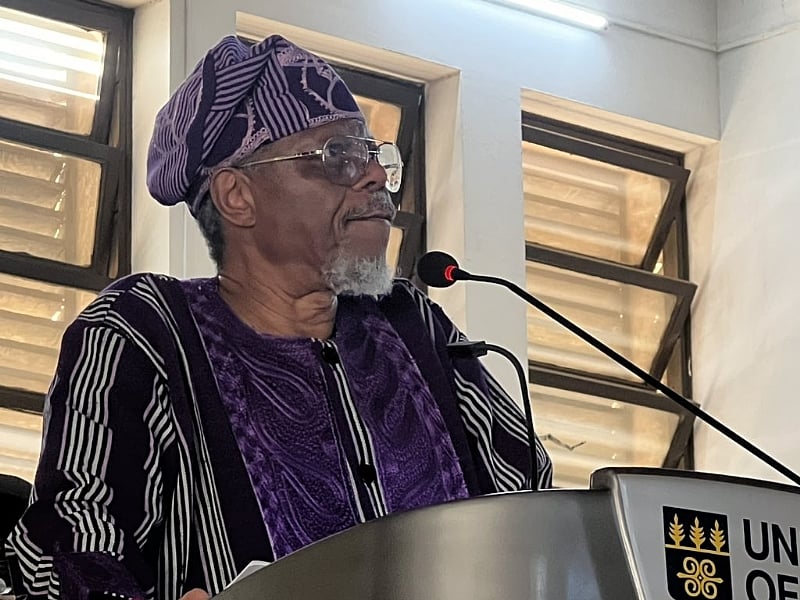On October 15, a thought-provoking lecture was delivered at the University of Ghana’s Great Hall by Professor Toyin Falola from the University of Texas at Austin, as part of the Anton Wilhelm Amo Lecture series organized by the Merian Institute for Advanced Studies in Africa (MIASA). The theme of the lecture, “Ancestral Knowledge for Contemporary Transformation,” resonated deeply with the audience and sparked a necessary dialogue regarding the importance of preserving indigenous knowledge among African youth. Prof. Falola passionately urged this demographic not to disregard their rich cultural heritage in the face of modernization and technological advancement. Emphasizing the importance of adapting and merging African traditional knowledge systems with contemporary technology, he encouraged young people to study technological innovations thoroughly while also connecting them with their ancestral roots.
Prof. Falola presented the vast potential that traditional knowledge, particularly regarding indigenous plants and their diverse uses, holds in addressing contemporary challenges. He suggested using technology as a bridge to extract valuable resources from Africa’s past to solve present problems. Through this call to action, he highlighted the importance of reclaiming lost indigenous knowledge and encouraged African nations to correct historical misinformation about their cultures and histories. Prof. Falola reiterated the significance of understanding one’s roots, indicating that this connection is vital for cultural identity and heritage, which, if nurtured, can serve as a foundation for personal and societal transformation.
Moreover, the scholar delved into the ethical dimensions intertwined with knowledge and governance, proposing that indigenous values could play a critical role in reforming corrupt leadership structures across the continent. His assertion that such knowledge systems could be instrumental in evaluating leadership provided a framework for thinking about governance in a way that respects and draws from African traditions. By intertwining traditional wisdom with modern governance practices, he posited that regions could cultivate systems that are not only effective but also culturally resonant.
Dr. Grace Diabah, Director of MIASA Ghana, provided the opening remarks, emphasizing the significance of the Anton Wilhelm Amo Lecture in elevating African voices within intellectual discourse. She highlighted the historical context of Amo—a Ghanaian philosopher of the 18th century who made substantial contributions to knowledge production in Germany—as an inspirational figure. The significance of his work and life serves to remind contemporary scholars of the potential African intellectual heritage offers to global academia, advocating for its recognition and relevance in modern discussions about knowledge and development.
The Anton Wilhelm Amo Lecture reflected MIASA’s broader mission to decolonize knowledge production and advocate for the elevation of African intellectual heritage on the world stage. Professor Falola’s exploration of ancestral knowledge exemplified MIASA’s commitment to fostering meaningful conversations around African knowledge systems within global contexts. This initiative is crucial not just to celebrate African heritage but also to integrate it into discussions of innovation and development in a world that often overlooks or marginalizes these contributions.
MIASA, established under the College of Humanities at the University of Ghana, plays a pivotal role in facilitating research collaboration and knowledge exchange among leading scholars from Ghana, Germany, and beyond. Funded jointly by the German Federal Ministry of Education and Research and the University of Ghana, MIASA stands as a platform that seeks to bridge cultural divides between Anglophone and Francophone Africa. It emphasizes the importance of enduring research relationships across the continent, ensuring that African voices are heard and respected in global academic discourse. By advocating for the preservation and integration of indigenous knowledge with modern advancements, MIASA and its initiatives like the Anton Wilhelm Amo Lecture series champion a vision for a collaborative and enriched future for African scholarship.


